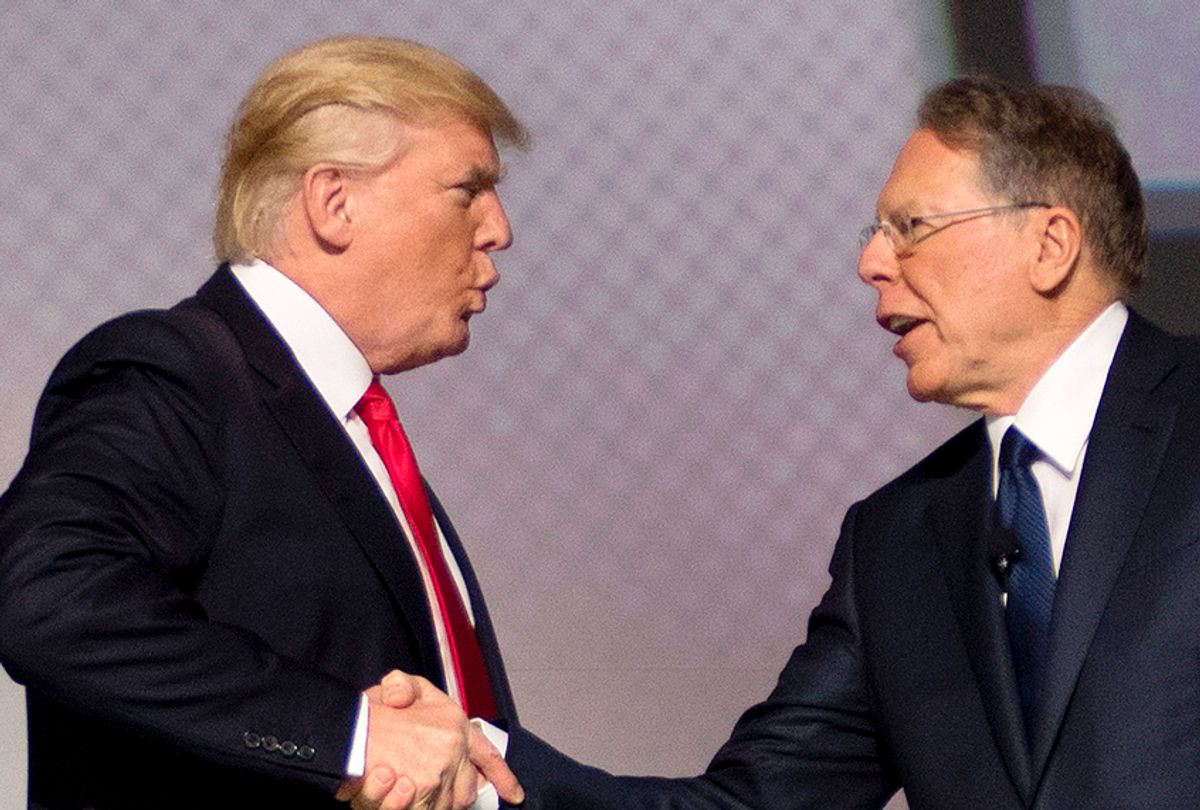After claiming in a recent televised meeting with congressional leaders that he supports expanded background checks and an assault weapons ban, Donald Trump has predictably reversed course and embraced a platform on school safety that seems as if it had been written by the NRA. The pro-gun organization spent more than $30 million to get Trump elected, after all, and clearly intends to get its money's worth.
But while Trump's public flip-flop on the gun safety issue garnered major headlines, what's less well covered is the quiet but crucial step the president is taking to protect the gun industry's profits: Stacking the courts with rabidly pro-gun federal judges, who pose a real threat to the integrity of state and local gun regulations. With the recent escalation of pressure on politicians to pass meaningful legislation controlling who can buy guns and what kinds of guns they can buy, it's more important than ever to focus on the courts that will have the final say on whether new gun control laws can even be enforced.
“Over the years, the courts have been actively engaged in interpreting the reach of the Second Amendment and articulating its meaning," explained Nan Aron, president of Alliance for Justice, which has been trying to raise awareness about the far-right leanings of many of Trump's judicial picks. “Those who sit on the federal bench will be making the ultimate decision as to whether common sense gun safety measures will survive a challenge by the gun lobby.”
Adam Skaggs, chief counsel of the Giffords Law Center to Prevent Gun Violence, agreed. “Most of the gun lobby’s attempts to have reasonable gun laws struck down have failed," he said. "But obviously, if President Trump is able to stack the courts with NRA lawyers, then the gun lobby may find a more receptive ear when it goes to the federal courts.”
The NRA's work in shaping legislation and lobbying politicians has been heavily covered, but the organization also devotes ample resources to filling the government with gun-loving judges and prosecutors, often by going through intermediary organizations. Under Trump, however, the NRA seems to have amped up its efforts to influence judicial nominees, taking advantage of the large number of vacancies on the federal bench that Trump and Senate Majority Leader Mitch McConnell are filling at a record pace.
The most prominent of those nominees, of course, is Neil Gorsuch, who was nominated to the Supreme Court by Trump after McConnell held the seat open for a year to prevent Merrick Garland, Barack Obama's nominee, from taking the seat. The NRA spent about $1 million in advertising to support the Gorsuch nomination. But Trump has also offered up a whole slate of judicial picks who appear to hold extremist views of what constitutes "gun rights," and many of them have already been endorsed by the NRA.
During the NRA convention last April, Trump gave a speech promising, "You came through for me, and I am going to come through for you." He swiftly made good on that promise, nominating Allison Eid, confirmed in November as a judge on the 10th U.S. Circuit Court. Among her many other unsavory views, Eid is enthusiastic about getting guns into schools. She openly opposed banning guns in school zones and, while on the Colorado Supreme Court, wrote the opinion striking down the University of Colorado's ban on guns on campus.
Last month, the Senate Judiciary Committee approved the nomination of Howard Nielson Jr. to a Utah district court, despite all the negative attention he received for his opposition to LGBT rights and support for legalizing torture. But Nielson is also a pro-gun extremist who built his career working as a top lawyer for the NRA. During that time, he sued to remove age restrictions on handgun sales and concealed carry permits. He also tried to get an Illinois ban on assault weapons overturned, arguing that the high-powered rifles used in massacres like the Parkland and Las Vegas shootings were not as dangerous as pistols or revolvers.
Another Trump nominee, William Ray, who is up for district court in Georgia, even rejected the idea that guns are too dangerous for children. During his time in the state legislature, Ray blocked a bill that would have made it a misdemeanor in Georgia to leave a handgun within the reach of children.
Another nominee, Mark Norris, also embraced the guns-everywhere-for-everyone philosophy during his time in a state legislature, this time in Tennessee. He repeatedly voted for bills to allow guns on campus, in public parks and even in bars.
The NRA happily brags about its influence over Trump's judicial picks to the group's membership, sharing a video on NRA TV showing the organization's vice president and CEO, Wayne LaPierre, sitting next to Trump during a meeting about the Gorsuch nomination. But when the Giffords Law Center tried to find out more about how much sway the gun lobby has on Trump administration court-stacking, it met with resistance.
“We filed freedom-of-information requests seeking public records indicating the gun lobby’s influence," Skaggs explained. "The administration did not fulfill those requests, so we filed a lawsuit seeking to compel the production of these records that are available to the public under the sunshine law.”
The courts don't come up much in public discourse about gun control, but the judiciary matters a great deal when it comes to whether or not meaningful regulations can be enacted. For instance, as Aron of Alliance for Justice notes, the modest gun-reform bill recently signed into law by Florida Gov. Rick Scott is already being challenged by pro-gun groups. NRA court challenges of that nature, many of them pursued by NRA lawyer-turned-Trump nominee Nielson, have repeatedly failed in the past. But if Trump packs enough pro-gun zealots onto the federal bench, we may find there's not much legislatures can do to halt the "guns everywhere" agenda.



Shares